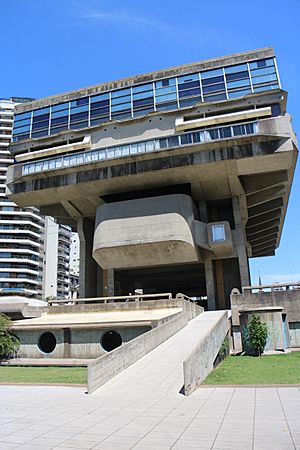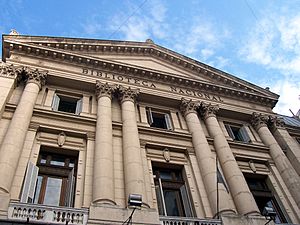National Library of the Argentine Republic facts for kids
Quick facts for kids National Library of the Argentine Republic |
|
|---|---|
 |
|
| The current building, photographed in 2013 | |
| Country | Argentina |
| Type | National Library |
| Established | 1810 |
| Location | Agüero 2502 Recoleta, Buenos Aires |
| Other information | |
| Budget | A$ 651,345,809 (2018) |
| Director | Juan Sasturain |
| Staff | 38 (2018) |
| Phone number | (0)11 4806 1929 |
The Mariano Moreno National Library (which in Spanish is Biblioteca Nacional Mariano Moreno) is the biggest library in Argentina. You can find it in the Recoleta neighborhood of Buenos Aires. This important library is named after Mariano Moreno. He was a key thinker during the May Revolution and also the library's very first director.
The National Library is part of Argentina's Ministry of Culture.
Contents
The Library's Story
Starting as a Public Library
The library first opened in September 1810. It was created by a decision of the first Government Junta of the May Revolution. Back then, it was called the Public Library of Buenos Aires. In 1884, it became the country's only national library. At that time, its name officially changed to the National Library of Argentina.
The library's first home was an old mansion from the 1700s. This building used to belong to the Jesuits. It was located on the corner of Moreno Street and Peru Street. This area is known as the Manzana de Las Luces.
Mariano Moreno, the first director, wanted to create the library. He believed it would help people learn about politics and civic life. The library was also founded to support public education. This was seen as a way to build an independent country.
The first collection of books came from different places. Some were from Bishop Orellana's personal collection. Others were donations from the Cabildo, the Real Colegio San Carlos, and Manuel Belgrano. The library's first main directors were Dr. Saturnino Segurola and Fray Cayetano Rodriguez. Many important Argentine thinkers and writers followed them as directors.
Becoming the National Library
When Buenos Aires became the capital city, the Public Library of Buenos Aires became the National Library. Antonio Wilde was chosen as its director. He was followed by Paul Groussac. Groussac created a special system to organize the books. He also helped catalog old handwritten books. He started two important magazines: La Biblioteca and Los Anales de la Biblioteca.
Another big step was opening a new building in 1901. This building was on Mexico Street in the Montserrat area. It was first designed for the National Lottery. So, visitors were often surprised to see stairs decorated with lottery symbols!
During Groussac's time as director, the library gained many important collections. These included books from Angel Justiniano Carranza and Amancio Alcorta. Martín García Merou's collection also joined the library. It had valuable papers about the founding of Buenos Aires. Sadly, like later director Jorge Luis Borges, Groussac became blind. He continued to work as director for some years before he passed away in 1929.
In 1931, the famous writer Gustavo Martínez Zuviría became the library's director. He focused on making the library services more modern. He also helped the library's collection grow. This added to Argentina's cultural heritage.
The next director was Jorge Luis Borges, a very important Argentine writer. He led the library from 1955 to 1973. He worked with his vice director, Edmundo José Clemente. Soon after Borges became director, he was told his eyesight was getting worse. He would eventually lose his ability to read and write.
A New Home for the Library
Edmundo José Clemente, Borges's close friend, was very involved in building the new library. The new building was placed where the Unzué Palace used to be. This palace was the official home of President Juan Perón and his wife Evita. The palace was torn down in 1958. After that, the land was chosen for the library's new main building.
The design for the new building was made in 1961. It has a style called brutalist. This means it uses a lot of concrete and has a strong, blocky look. However, construction did not start until 1971. The new library finally opened on April 10, 1992.
Changes in government and other issues caused delays in the project. The original design team included Clorindo Testa, Francisco Bullrich, and Alicia Cazzaniga. With the new building, there was a need for trained staff. This led to the creation of the National School of Librarians at the old building.
See also
 In Spanish: Biblioteca Nacional (Argentina) para niños
In Spanish: Biblioteca Nacional (Argentina) para niños
 | Sharif Bey |
 | Hale Woodruff |
 | Richmond Barthé |
 | Purvis Young |


